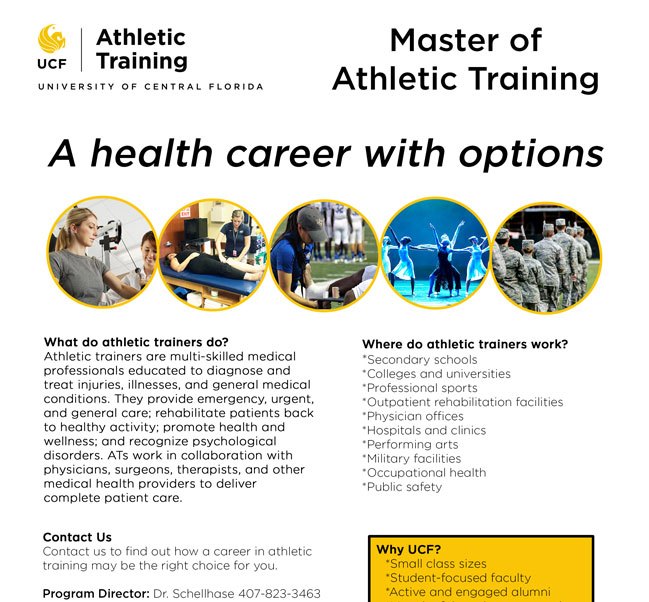Master’s Program (MAT)
UCF Athletic Training Program
Overview
UCF offers a rigorous full-time, fully accredited graduate program in athletic training leading to the Master of Athletic Training (MAT) degree. The program combines face-to-face learning with hands-on lab experiences, active research, and a diverse clinical component. By combining excellence in evidence-based, patient-focused education, the latest technologies available, and outstanding clinical site affiliations, the program fully prepares graduates to take and pass the comprehensive Board of Certification (BOC) exam and start their careers as athletic trainers.
The program incorporates the Curricular Content Standards set forth by the Commission on Accreditation of Athletic Training Education (CAATE). Courses are taught in a prescribed sequence (as described in the UCF Graduate Catalog) over six semesters and includes full immersion in clinical education settings under the direct supervision of a certified and licensed athletic trainer.
Undergraduate Preparation
No one type of bachelor’s degree is required by the MAT program. However, students should seek a degree that is relevant (kinesiology, health science, interdisciplinary studies, etc.) and provides the opportunity to complete the prerequisite courses and other admissions requirements.
Clinical Education Experience
Students gain valuable experience in a variety of clinical settings throughout the duration of the program. UCF’s clinical education experiences provide exposure to universities, secondary schools and outpatient rehabilitation clinics, as well as to industrial and performing arts settings. Care is taken to ensure all students gain experience with upper- and lower-extremity sports, equipment-intensive sports, high- and low-risk sports, male and female sports, non-orthopaedic conditions, and patients of various socioeconomic status.
The diversity of our clinical education settings enables students to gain experience in almost all areas in which athletic trainers can be employed.
- Orlando Solar Bears – ECHL
- Orlando City Soccer Club Lions – MLS
- Orlando City Soccer Club Pride – NWSL
Students are exposed to a variety of orthopaedic and non-orthopaedic conditions that occur in professional team athletics. Students gain experience communicating with physicians, coaches and administrative personnel.
- Orange County Public Schools (OCPS)
- Seminole County Public Schools (SCPS)
- Bishop Moore Catholic School
- Trinity Preparatory School (Grades 7-12)
- Lake Highland Preparatory School (Grades 7-12)
- Windermere Preparatory School (Grades 7-12)
- Montverde Academy
- Orangewood Christian School
Students are exposed to a variety of orthopaedic and non-orthopaedic conditions that occur in middle school and high school athletics. Students gain experience traveling with teams and communicating with parents, physicians, coaches and administrative personnel.
- Kennedy Space Center RehabWorks
At Kennedy Space Center RehabWorks, students gain experience in an industrial setting where overuse injuries and accidents require outpatient rehabilitation. The facility focuses on injury prevention and risk management to keep the “industrial athletes” at the space center healthy. Students learn about the unique needs of industrial patients in this unique and innovative setting.
- UCF Recreation and Wellness Center (RWC)
The Recreation and Wellness Center is open to all UCF students and provides athletic training services to students and staff and faculty members with membership at the center. Students are exposed to the orthopaedic and non-orthopaedic conditions that occur during intramural sports, sport clubs, adaptive and inclusive recreation, outdoor adventure, fitness, and aquatics.
- UCF Athletics Association (UCFAA)
- Rollins College
- Stetson University
Students are exposed to a variety of orthopaedic and non-orthopaedic conditions that occur in university and collegiate athletics, including collegiate cheerleading and dance. Students gain experience traveling with teams and communicating with physicians, coaches and administrative personnel.
- Sports Specific Training & Rehabilitation (SST)
Sports Specific Training is an outpatient rehabilitation facility that focuses on injury prevention and sports medicine services. Students are exposed to athletic trainers and physical therapists who lead their clients through rehabilitation and performance goals.
- Orlando Sports Medicine
Orlando Sports Medicine offers outpatient rehabilitation, post-surgical care and concussion management for both sport and non-sport populations. Students are exposed athletic trainers and physical therapists who lead their clients through rehabilitation and performance goals.
- WWE Performance Center
Students are exposed to a variety of orthopaedic and non-orthopaedic conditions that occur in professional team athletics. Students gain experience communicating with physicians, coaches and administrative personnel.

